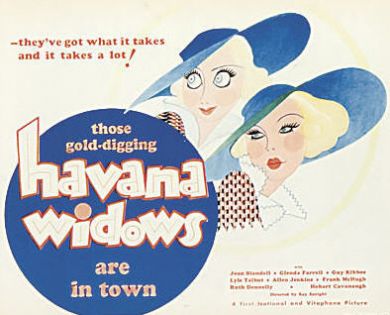They’ve got what it takes and it takes a lot!
Joan Blondell was one busy lady during her almost ten year time at Warner Brothers. She was busier still at the front end of this period, the early 1930s. She made a few really good movies while at Warners and a few clunkers. Most were like 1933’s Havana Widows, solid but unimaginatively tepid programmers.
As biographer Matthew Kennedy notes, Joan never got to the top of the mountain when it came to stars of the period, but it wasn’t due to any lack of talent. In most of her pictures of the period she plays a gritty, no-nonsense girl with a deviously good sense of humor. Havana Widows fits cleanly into this category.
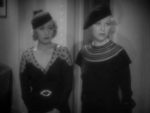 Here she’s cast as Mae, a burlesque dancer in a third-rate show in New York City. After getting suspended for a week for refusing to work a stag party, she and her fellow dancer and roommate Sadie (Glenda Farrell) decide to head off to Havana to make a financial killing. Their so strapped for funds they get Mae’s rather unwanted boyfriend and low-level ganster Herman Brody (Allen Jenkins) to front them the money after getting a loan from his Boss.
Here she’s cast as Mae, a burlesque dancer in a third-rate show in New York City. After getting suspended for a week for refusing to work a stag party, she and her fellow dancer and roommate Sadie (Glenda Farrell) decide to head off to Havana to make a financial killing. Their so strapped for funds they get Mae’s rather unwanted boyfriend and low-level ganster Herman Brody (Allen Jenkins) to front them the money after getting a loan from his Boss.
They get down to Havana full in their high society widow personas, with Sadie especially touting an especially effective snobbish accent. Early on during their stay they meet a trifecta of men with whom they conspire for the rest of the picture. Frank McHugh is Duffy, Havana’s resident legal expert in getting widows and others financial settlements with varying degrees of justification. Guy Kibbee and Ruth Donnelly are Deacon and Emily Jones, respectively, while Lyle Talbot is their son Bob.
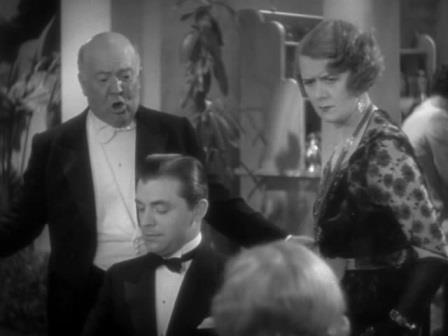 Deacon is their target, and they try a few times to entrap him so as to get a fat settlement from him, but Mae throws a curve by falling for Bob, who may or may not be penniless on his own. There’s quite a bit of chicanery as one point poor Guy Kibbee is forcibly stripped as part of their plan.
Deacon is their target, and they try a few times to entrap him so as to get a fat settlement from him, but Mae throws a curve by falling for Bob, who may or may not be penniless on his own. There’s quite a bit of chicanery as one point poor Guy Kibbee is forcibly stripped as part of their plan.
It’s a great sable of era Warners’ talent, though you’d wish the end result was a bit more engaging. Havana Widows isn’t a bad picture but rather a formulaic potboiler. Be glad we’ve gotten so much talent, though one would imagine that the film had a short production schedule and these folks just happened to be between projects.
But formulaic doesn’t mean bad beyond reproach either, as there’s a good amount to enjoy here as well. Granted, there aren’t any laugh out loud moments here and the humor is cute rather than outright funny. Glenda is clearly the brains of the operation, while Joan Blondell provides the body, though both occasionally cross over into the other’s turf. Though both ladies come off well, the star here of course is Joan Blondell who is her usual vivacious self. If only she could talk as fast as Glenda Farrell does here!
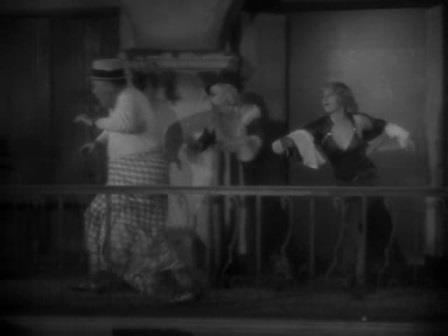 It’s nice as usual to see Guy Kibbee in one of his larger roles. Kibbee, who regardless of picture, always seems to be in a good mood, is completely nonplussed whther he awakens in someone else’s hotel room or forcibly stripped in an abandoned house masquerading as a massage parlor. Though perhaps showing “more” of Kibbee than most would like to see, watching him in his long-johns and picnic table cover-up being chased by Blondell in her latest (and best yet) gown across the rooftops may be worth the price of admission itself.
It’s nice as usual to see Guy Kibbee in one of his larger roles. Kibbee, who regardless of picture, always seems to be in a good mood, is completely nonplussed whther he awakens in someone else’s hotel room or forcibly stripped in an abandoned house masquerading as a massage parlor. Though perhaps showing “more” of Kibbee than most would like to see, watching him in his long-johns and picnic table cover-up being chased by Blondell in her latest (and best yet) gown across the rooftops may be worth the price of admission itself.
Frank McHugh and Allen Jenkins are along for the ride, with McHugh contributing little outside of his drunken shtick, which unfortunately grows old rather quickly. Jenkins vanishes for the middle of the picture until he reappears towards the end, though his rather dimwitted mobster routine also ages not as well as one would like. Both do well with what they are given though.
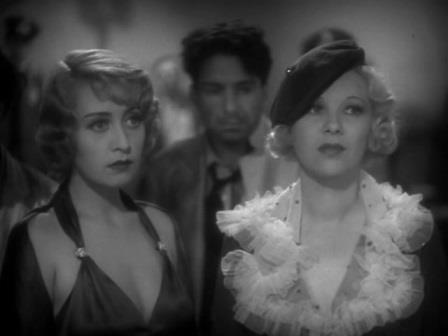 Like most studio releases from the time, you’ve got to suspend belief a bit here and there and not look too closely. You’ll most always spot sets and costumes from other pictures hidden among the odds and ends, and the same is true here. Both Joan and Glenda sport a cascading sequence of fine dresses and gowns which seem to counter their claims of being so hard up for cash, with each one Joan wears being cut lower than the last one. It’d seem that selling a bit of wardrobe might be all the doctor orders; then again that’s why we don’t look too close.
Like most studio releases from the time, you’ve got to suspend belief a bit here and there and not look too closely. You’ll most always spot sets and costumes from other pictures hidden among the odds and ends, and the same is true here. Both Joan and Glenda sport a cascading sequence of fine dresses and gowns which seem to counter their claims of being so hard up for cash, with each one Joan wears being cut lower than the last one. It’d seem that selling a bit of wardrobe might be all the doctor orders; then again that’s why we don’t look too close.
Havana Widows was a success on release and you can clearly see why. Though not breaking any real new ground, it’s a decent light comedy which is fun and engaging to watch without requiring a huge time investment (the running time is only about an hour).
